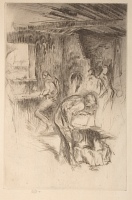Etchings Institutions search term: dowdeswell
The Little Forge, Liverpool | ||
| Number: | 141 | |
| Date: | 1875 | |
| Medium: | drypoint | |
| Size: | 228 x 152 mm | |
| Signed: | butterfly at lower left (8); removed (9); butterfly at lower left (10-final) | |
| Inscribed: | no | |
| Set/Publication: | no | |
| No. of States: | 16 | |
| Known impressions: | 19 | |
| Catalogues: | K.147; M.145; W.115 | |
| Impressions taken from this plate (19) | ||
TECHNIQUE
Not only is there a sketch for this drypoint 7 but there are several worked proofs, including the first proof worked on in crayon, reproduced above ( ), and another on watermarked paper touched up in pen (possibly quill pen) and wash (
), and another on watermarked paper touched up in pen (possibly quill pen) and wash ( ).
).
 ), and another on watermarked paper touched up in pen (possibly quill pen) and wash (
), and another on watermarked paper touched up in pen (possibly quill pen) and wash ( ).
).7: British Museum, London; MacDonald 1995 (cat. no. 574).
The large print-run of over 20 impressions is unusual for a drypoint, and the number of states - 16 - reflects the need to maintain and enhance the richness and delicacy of the drypoint lines.
PRINTING
Impressions were printed in black ink, with some tone, and soft burr in many impressions. An unusual selection of old laid papers was used for printing this drypoint. These included several sheets with an Arms of Amsterdam watermark ( ,
,  ,
,  , possibly
, possibly  ,
,  ,
,  ). These were used for impressions of six different states from the first to the last. Other sheets bear watermarks of a Hunting horn over 'WR' (
). These were used for impressions of six different states from the first to the last. Other sheets bear watermarks of a Hunting horn over 'WR' ( ) and a Posthorn in a crowned shield (
) and a Posthorn in a crowned shield ( ); and the countermarks, 'IV' (
); and the countermarks, 'IV' ( ) and '[B?] D' (
) and '[B?] D' ( ).
).
 ,
,  ,
,  , possibly
, possibly  ,
,  ,
,  ). These were used for impressions of six different states from the first to the last. Other sheets bear watermarks of a Hunting horn over 'WR' (
). These were used for impressions of six different states from the first to the last. Other sheets bear watermarks of a Hunting horn over 'WR' ( ) and a Posthorn in a crowned shield (
) and a Posthorn in a crowned shield ( ); and the countermarks, 'IV' (
); and the countermarks, 'IV' ( ) and '[B?] D' (
) and '[B?] D' ( ).
).Some of these sheets were removed from an old book or ledger and have old pen inscriptions - possibly in Dutch - on the verso ( ,
,  ,
,  ). One sheet of 'antique' (pre-1800) laid paper, possibly with a watermark, has a note on the verso, with the legible words 'Joseph' and 'Glossig pag.' suggesting that it was the glossary for a biblical text (
). One sheet of 'antique' (pre-1800) laid paper, possibly with a watermark, has a note on the verso, with the legible words 'Joseph' and 'Glossig pag.' suggesting that it was the glossary for a biblical text ( ). Several old sheets have Latin inscriptions on the verso (i.e.
). Several old sheets have Latin inscriptions on the verso (i.e.  ) One such inscription may have been an index or concordance (
) One such inscription may have been an index or concordance ( ):
):
 ,
,  ,
,  ). One sheet of 'antique' (pre-1800) laid paper, possibly with a watermark, has a note on the verso, with the legible words 'Joseph' and 'Glossig pag.' suggesting that it was the glossary for a biblical text (
). One sheet of 'antique' (pre-1800) laid paper, possibly with a watermark, has a note on the verso, with the legible words 'Joseph' and 'Glossig pag.' suggesting that it was the glossary for a biblical text ( ). Several old sheets have Latin inscriptions on the verso (i.e.
). Several old sheets have Latin inscriptions on the verso (i.e.  ) One such inscription may have been an index or concordance (
) One such inscription may have been an index or concordance ( ):
):
'formationis memoria quomodo celebratur in ... //[via epistola indita Fpg reformationis spertant...?] p. 107/ 807/ & 243').
'Argilius adulescens [Lacadamonus] quem Pausanias amore venerio dilexit. rep. Paus'
This may be a version of 'Argilius quidam adulescentulus, quem puerum Pausanias amore venerio dilexerat', from Cornelii Nepotis Vitae. Cornelius Nepos (ca 99-24BC) was a Roman historian, who wrote a number of biographies including a text on Pausanius (d. ca. 470 BC), Regent of Sparta.

